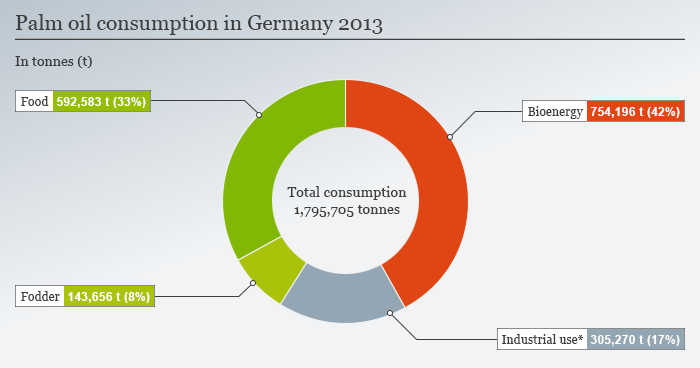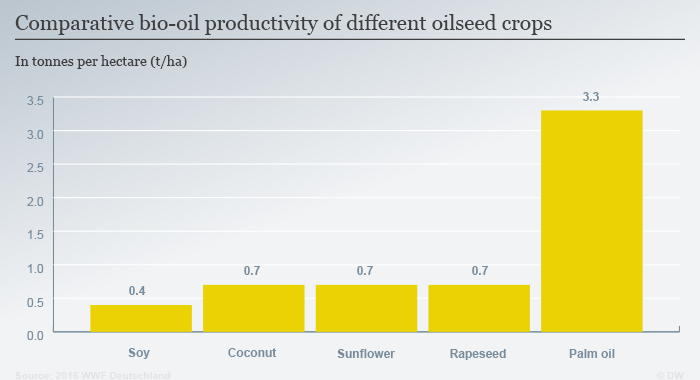A new WWF report says palm oil plantations drive destruction of biodiverse tropical forests, but substitute vegetable oils use even more land. The solution: Reduce demand. And maybe, in future, make oil from algae.
Palm oil is an extraordinarily useful commodity that’s used in everything from candy bars, detergents and lip moisturizer to – increasingly – biodiesel fuel for automobiles, among dozens of other products.
Palm oil makes food products and cosmetics creamier. When it’s refined into biofuel, it replaces fossil-fuel diesel. That’s meant to reduce carbon emissions from internal combustion engines. But if biofuel demand drives further clearing of natural forests, that’s tantamount to feeding bird-of-paradise feathers, Sumatran tigers, orangutans and tree kangaroos into the petrol tank.
Korean-Indonesian corporation Korindo is a case in point: It has destroyed tens of thousands of hectares of pristine Papuan rainforest in recent years in order to plant oil palm monocultures. (The picture below shows an area of forest cleared by Korindo.)
“The extent of Korindo’s systematic clearing and burning of Indonesia’s pristine rainforest is downright tragic…an industry-wide ban on deforestation is needed immediately,” said Deborah Lapidus, a campaign manager for Mighty Earth, which is pushing palm-oil trading companies to boycott any suppliers that are continuing to destroy natural forests in order to plant oil palms.
Palm oil demand is rising fast
Korindo is far from the only company deforesting jungles for palm oil production. European biodiesel guidelines specify a “no deforestation” rule for sourcing the raw materials for making low-carbon fuel. But in reality, the huge increase in total demand for plam oil caused by European biodiesel inherently drives further deforestation.
Global production of palm oil has doubled over the last decade. By 2000, palm oil was the most produced and traded vegetable oil, accounting for 40 percent of all vegetable oils traded internationally. By 2006, that number had risen to 65 percent, according to the UN Food and Agriculture Organization (FAO).
Worldwide demand for palm oil is expected to double again by 2050, and could reach 240 million metric tons, according to FAO. New plantations are being developed and existing ones expanded in Indonesia, Malaysia and other Asian countries, as well as in Africa and Latin America.
Green groups want palm oil to be produced exclusively from degraded lands that were deforested long ago – and not from fresh conversion of as-yet pristine forests. They’re urging palm oil traders to develop a joint palm oil supply chain monitoring capacity, and to boycott all producers that continue to cause deforestation.
Can palm oil be replaced? Not easily
But in the long run, the question is whether the burgeoning demand for palm oil can be curtailed, so that pressure on tropical forestland is lessened. According to a new study commissioned by WWF Germany, the answer, unfortunately, is no – at least, not using any other bio-oil crop currently commercially available.

Infografic: Amounts of palm oil used for various purposes in Germany, 2013. Biodiesel alone used 41 percent of the total
Oil palm plantations generate about 3.3 tons of oil per hectare per year, which is much more than any commercially available alternative bio-oil crop. Rapeseed, for example, produces less than a quarter than that – about 0.7 tons per hectare. It would take four times as much land to produce the same amount of oil.
“Substituting away from palm oil would actually make the problem of land-use pressures from bio-oil production worse,” the WWF report concludes.
However, Steffen Noleppa, co-author of the report along with with his colleague Matti Cartsburg of the consultancy “Agropol,” told DW they didn’t examine one possible new-technology alternative source of bio-oils: Algae.
Algae-powered jet engines
Natural vegetable oils can be produced from some strains of micro-algae, grown in closed tanks or in open ponds. If it’s grown in ponds, the amount of space required would be about 15 times less per ton of oil than for rapeseed, or four times less than for oil palm plantations – and algae can be grown on desert or semi-desert land, with water pumped in.
But Franziska Müller-Langer, head of the biorefineries working group at DBFZ, the German Biomass Research Center in Leipzig, told DW that it would likely be many years before biofuels can be produced at commercial prices using micro-algae.
“The problem is that some strains of micro-algae that have a high oil content can be grown successfully in tanks, but it’s very expensive,” she said. “The tanks, the need to provide a flow of nutrients and CO2, staff to run the operation – and that’s before you’ve even got to the next stage, which is to separate the oils from the rest of the algal mass.”

Comparative productivity of different oil-seed crops, tonnes per hectare. Oil palms are by far the most productive – except for oil from algae (not shown), but that’s expensive
Algae can be grown more cheaply in open ponds, Müller-Langer said, but then it’s not possible to grow pure strains of specially selected oil-rich algae, because wild strains continually contaminate open ponds.
“There are various other processes, like thermal depolymerization, which can be used to produce biofuels from algae without any need to separate out oils, but they’re not commercially viable yet either,” she said.
She added that without a stable, long-term framework of subsidies, few corporations would be prepared to invest millions and 10 to 15 years of effort on development work needed to create and optimize pilot plants and production processes.
That said, a project called “AUFWIND” is currently underway in Germany, involving the Jülich research center and aircraft maker Airbus, working on production processes to supply algae-based kerosine for jet engines.
For the time being, algal oil remains much more expensive to produce than palm oil. But tropical forests are disappearing very quickly. If the world wants to keep its legacy of tropical forests,with their orangutans, forest elephants, tigers, jaguars, macaws, birds-of-paradise and tree kangaroos – tropical forests are by far the most species-rich land environments on Earth – then perhaps a few billion in public funds should be invested in finding a way to cheaply produce vegetable oil or biofuels from algae – as soon as possible.

A ridiculously cute Goodfellow tree kangaroo, Dendrolagus goodfellowi. Papua’s tree kangaroos won’t survive without plenty of natural forest
Can we use less palm oil? Yes
Another key to reducing pressure on tropical forests, the WWF report said, is to reduce demand for vegetable oil. About 60 million tons (Mt) of palm oil was produced globally in 2015, of which 35 Mt was produced in Indonesia, 21 Mt in Malaysia and 5 Mt elsewhere in the tropics.
Global output was just 15 Mt in 1995, so production quadrupled in just the last 20 years. Volumes continue to rise rapidly, and are expected to be up by 10 percent in 2016 compared to last year.
Germany alone used 1.8 million tons in 2015. Noleppa and Cartsburg found that 41 percent of Germany’s annual palm oil consumption was used to make biodiesel to power automobiles, under a legislated biofuels mandate meant to reduce carbon emissions from transportation. Another 40 percent went into a diverse range of food products or animal feed. Similar numbers are true for Europe as a whole.
It will be difficult to reduce consumption of palm oil in food products, but it would be straightforward for European policymakers to end the EU’s biofuels mandate. Stronger energy efficiency guidelines for cars and trucks, and a faster move toward hybrid and all-electric vehicles, will be far more effective and incomparably less environmentally damaging ways of reducing CO2 emissions from transportation than biodiesel supplies can ever be.
